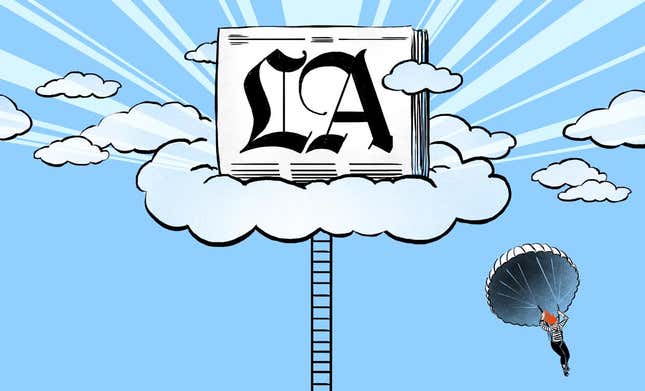Why I Quit My Dream Newspaper Job After Four Months
Latest

Two months ago, I quit the best job I ever had. At least, I’m sure that’s how it looks. Writing is one of those professions that automatically elicits people’s opinions about your work, and since quitting, I’ve encountered enough split-second pauses to develop a strong feeling that the decision makes me look either stupid, incompetent, or both.
The supporting evidence is considerable. When I left, I had little to no nest-egg to live on. I had a few prospects, but nothing sustainable. Now I’m up to my ears in credit-card debt. I haven’t received a paycheck in weeks. I also can’t recall a time in my adult life when I’ve been happier.
The perks of life as your own boss are as obvious as its downsides, but I don’t believe anyone really wants to be a freelancer, at least not at first. Upon graduating J-School in 2010, I had braced myself for the absence of job security, only to be saved by an unlikely staff position in the eleventh hour. Then, two years later—seven months into my second job—the magazine’s new owners cleaned house and my colleagues and I found ourselves unemployed. So I turned to freelancing as a transition, vowing to collect a little money until I could replace my old gig. After all, no benefits? No office or support system? Just slaving away, piecing together an adult-sized income a couple hundred bucks at a time? Who would want that kind of hell?
Against all my expectations: me.
Two and a half years after the layoff, I was still self-employed. I had good bylines, great relationships with supportive editors, and, most remarkably, a network of journalists who had my back, should I need additional help. I’d still been steadily interviewing, for more jobs than I can count now—but somehow each opportunity eventually disappeared, often for odd reasons, some of which I still don’t understand. In the meantime, I sometimes found myself actually enjoying working alone on my couch. I wasn’t making two dollars a word or anything, but I started earning a decent, mostly-consistent living after a while; at one point, I even got paid to write about freelancing itself. Each time a new writer emailed me for guidance, it felt like another confirmation of my success, a sign, even: I didn’t need a full-time gig anymore.
But then one of these evaporated jobs came back to life, and after a few more interviews (all of which, in total, ended up spanning nine months), the Los Angeles Times offered me a job. By any reasonable professional standard, it was a Great Job: The publication was impressive, it was a high-profile management position—pop music editor!—and it came with one of those unicorn salaries (plus benefits) to which most journalists rabidly aspire. The offer alone was enough to send anyone I told into shrieks of congratulations.
So I accepted it. Sure, I felt steadyish on my own. But I knew how quickly freelance life can slide into panic about money and inescapable anxiety brought on by unpredictable checks. I remembered, when it was bad, the regular paralysis of despair—the pity parties I would throw, crying on the couch and clinging to my dog until he wriggled free of my smothering embrace, asking myself why nobody wanted me enough to put their faith in me as a full-time staffer. I remembered the antidepressants I had to start taking about 18 months into self-employment when suddenly I found myself missing deadlines because I couldn’t get out of bed in the morning. Freelancing, for the joy of independence it gives you, can be an impossibly lonely place. And big career moves are the point of it all, right? The Times really seemed to want me, so much that they offered a salary bump for a dog-walker when I expressed concern about leaving Oscar at home all day. It’s really, really hard to turn down a Great Job; it seems unthinkable to turn down a Great Job That Badly Needs You.
Four months later, I was handing in my resignation letter.
A bad job can make you feel immediately unhinged, and even more so when, on the surface, it looks so much like success. Of course, there were red flags: that nine-month interview process, for one; the fact that one of the oldest, most tumultuous journalistic bureaucracies in the nation hired a twenty-something female editor to manage an all-male, all-older and nearly all-white team should’ve been another. At least I know what I’m getting into, I’d reasoned. But seeing red flags, it turns out, is not the same as anticipating what dealing with those red flags will do to you.
-

-

-

-

-

-

-

-

-

-

-

-

-

-

-

-

-

-

-

-

-

-

-

-

-

-

-

-

-

-

-

-

-

-

-

-

-

-

-

-








































